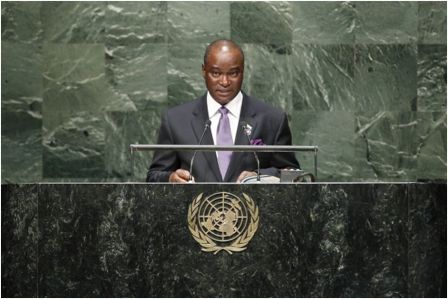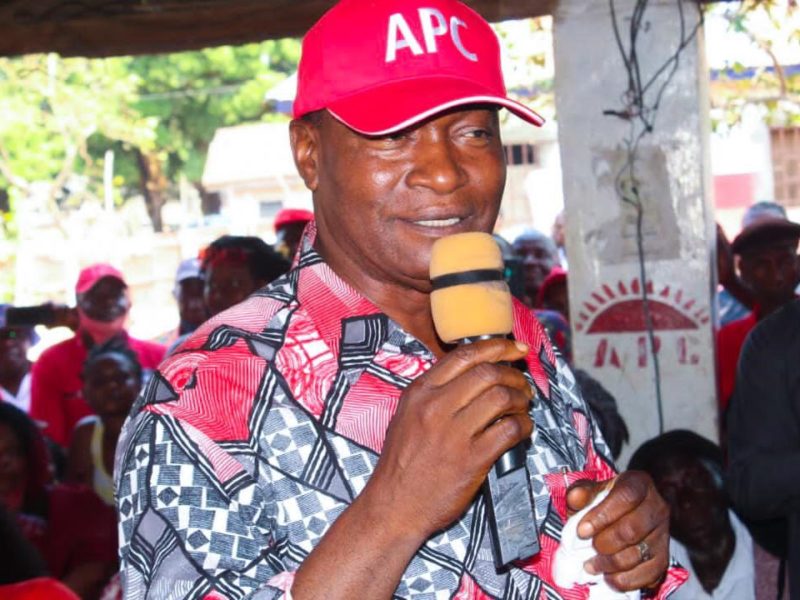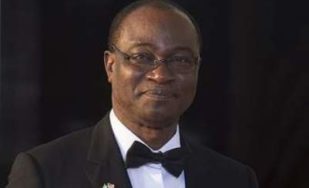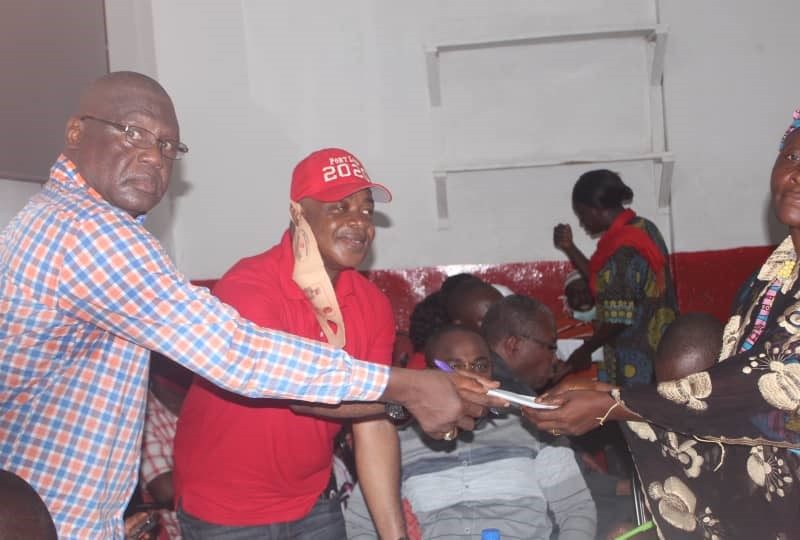Sierra Leone’s Foreign Minister Dr. Samura Kamara addresses the 69th Session of the UN General Assembly
Sierra Leone’s Minister of Foreign Affairs and International Cooperation, Dr. Samura Kamara, today addressed the 69th Session of the United Nations General Assembly . BELOW IS THE FULL STATEMENT.
Mr. President, Your Excellencies, Heads of State and Government, Colleague Ministers, Distinguished Delegates, Ladies and Gentlemen.I bring you fraternal greetings and very best wishes from His Excellency Dr. Ernest Bai Koroma, President of the Republic of Sierra Leone, and his beleaguered people. President Koroma deeply regrets that he is unable to participate in this 69th General Assembly due to obvious reasons. He has however instructed me to deliver to you this message from him, and I quote:
“I congratulate you on your election to conduct the affairs of the 69th Session of this august Assembly and to assure you of the support and cooperation of my country, Sierra Leone, during your tenure. To your predecessor, Ambassador John Ashe of Antigua and Barbuda, let me, on behalf of my Government and people, express our appreciation for his astute leadership and skill in smoothly directing the work of the last Session of the General Assembly.
My sincere thanks and appreciation also go to Secretary General Ban Ki-Moon, for his constructive and dynamic leadership of the Organization. Sierra Leone deeply appreciates his forward looking and laudable initiatives on issues of sustainable energy and climate change, among others. In particular, I appreciate his robust response to the Ebola epidemic that is causing so much havoc to our lives, our dignity, and our very existence. We will continue to support these highly ambitious and commendable initiatives for a better and safer world.
Mr. President,
Sierra Leone commends you for the choice, appropriateness and sense of urgency of the theme of the 69th Session of the General Assembly, and we join you in calling for a structured dialogue, strengthened global partnership and enhanced cooperation for its achievement. Sierra Leone wishes to reiterate the need to generate the required global political will to address the unfinished business of the Millennium Development Goals (MDGs) by focusing on implementation gaps as well as on new and emerging challenges. As Chair of the g7+ Group of countries, Sierra Leone reaffirms the call of this group of Fragile and Post-conflict States for the support of Goal 16 of the Outcome Document of the Open Working Group (OWG) on the need for Peace and Capable Institutions as a stand-alone goal in the final list of priorities under the Post-2015 Development Agenda.
Mr. President,
My country is at the battlefront of one of the biggest life and death challenges facing the global community. As I stated in my address to the UN Secretary-General’s High-Level Meeting on Response to the Ebola Virus Disease Outbreak, Ebola is a threat, unlike previous threats, not because something similar had never occurred before, but because this threat has mutated into a phenomena for which my country, my region, and the global community were grossly ill prepared. Isolated communities in the world are becoming less so in our globalized world; mutating viral diseases like Ebola could no longer be neatly isolated by just one isolated country in one isolated corner of the world. The Ebola outbreak in our region is the very first example of a world challenged by globally weak infrastructure and human capital public health and surveillance systems for dealing with faster occurrences of animal to human, and human to human transmissions of highly contagious diseases, made possible by quicker transportation, increasing urbanization and dense networks of people moving between rural and urban areas, and across borders.
We have been slow to meet this new challenge because no one recognized this confluence of trends could emerge with such virulence in West Africa. Our international partners were slow to recognize the threat for what it was, and when the recognition did come, it came with a spontaneous reaction of fear and panic that led to the closure of borders and imposition of travel restrictions to and from Sierra Leone and our sub-region.
This is the very first time Ebola got to our region and my country Sierra Leone. We did not bring it upon ourselves. We were rebuilding our infrastructure, implementing policies that were increasing our growth rates; improving our healthcare and literacy indicators; enhancing our peace; and strengthening our democracy. We were contributing troops to the United Nations peacekeeping operations in other lands, as a share of our peace dividend. The world was lauding us for doing so many things right; for being a symbol of fast paced recovery from a 10-year devastating civil conflict; for promoting and protecting human rights; and for advancing an impressive path of socio-economic reconstruction. We were gearing up our healthcare system to fight the known ailments of our land, such as malaria, maternal and infant mortality, Lassa fever, tuberculosis and typhoid, when Ebola struck. Based on the knowledge we had, based on the advice we were given by our international partners, we mobilized to meet this unfamiliar threat. But the staff, equipment, medicines and systems we had were inadequate and this slowed our effective response.
Several months down the line, the international community has finally come around to the better view that the Ebola Outbreak is a challenge for everyone; and that Sierra Leone and its sister Republics may be at the frontline of this fight, but it requires the heavy aerial and ground support of the world to defeat an outbreak, which in many ways, is worse than terrorism. As a country, we have taken extra-ordinary measures, including declaring a state of emergency, and shutting down the country for three days to get health educators unto every household in the country, and today, most of our people know that Ebola may show the same signs as a person with malaria, typhoid, diarrhea and other infectious diseases, but, it is far more deadly; and there is need to modify behavior to counter its transmission.
Mr. President,
Socio-economic disruptions are already being felt. We are no longer able to uphold our cultural systems and practices, including the shaking of hands, as we gladly receive each other, and religious and communal burial ceremonies. Our people live in fear and cannot understand the nature of a disease that claims a life and prevents family members from burying their loved ones. The indeterminate suspension of several on-going development projects, and the disruption to farming, mining, manufacturing, construction, tourism, trading and public transportation, following the outbreak of Ebola, are now undermining the growth and human development prospects of the country. The IMF has estimated that GDP will drop by 3.3 percent in 2014 – from 11.3 percent to 8 percent. Ebola has taken a stranglehold on the socio-economic prospects of the country, and we further risk reversing the hard gains we have achieved in Peacebuilding.
Mr. President,
We salute the great efforts of countries as well as international and national organizations that have committed resources to our common fight. We welcome the adoption of the landmark UN Security Council Resolution 2177 of 2014 and its General Assembly concurrence A/Res/69/1, both of which have recognized the Ebola Outbreak as a threat to international peace and security. We also salute the Secretary-General for his initiative of establishing the first ever UN emergency health mission, the United Nations Mission for Ebola Emergency Response (UNMEER), to lead a concerted and coordinated effort to contain and defeat this scourge within the sub-region.
Let us also know that to defeat the disease, and future outbreaks anywhere in the world, we must improve our capacities for quicker response. In Sierra Leone, this calls for faster deployment of staff, medicines and equipment at the global and national levels. Globally, faster response warrants quickening the pace of resource mobilization and disbursements as well as the development of vaccines and curative medicines. Nationally, our effort must rapidly translate into effective urban and rural community response initiatives. Any break in this chain of fast response makes the challenge more difficult to meet, and not meeting these challenges would result in more deaths in our country, and greater possibilities of the virus mutating and spreading into areas where it is currently absent. The world needs a faster Global Response Infrastructure to deal with this new trend that is today manifesting itself in the West African nations of Guinea, Liberia and Sierra Leone, but to which no country could be immune. Ebola is running faster than us, and for an impacting start, treatment beds must surpass Ebola cases. Only when the number of available beds surpasses the number of cases can we say Ebola is under control. This is a fight for all of us; we must prove that humanity will be equal to this new challenge to our collective existence.
We also believe it is high time this Assembly makes its voice heard on flight bans and cancellations to our countries, following the outbreak of the deadly Ebola Virus Disease. The World Health Organization and many others have advised against these blanket flight bans. We therefore urge member states to re-examine their policies of isolating and stigmatizing Ebola affected countries and their respective citizens. The world is too globalized for policies that shun engagements with a democratic nation. The UN was founded on a mandate to confront human insecurity, and not on shunning it. This organization was also founded on the principles of doing better. We strongly request this fidelity to the founding ideals of our global organization.
Mr. President,
Despite the daunting challenge facing us as a nation and sub-region, Sierra Leone will continue to remain a trusted and strategic partner in the global effort towards eradicating poverty, achieving sustainable peace, stability and development. My Government is determined and committed to forging more intense engagement with all countries, especially within the context of the New Deal for Engagement in Fragile and Post-conflict States.
As Coordinator of the African Union Committee of Ten Heads of State on the Reform of the United Nations, we will continue to advance the African Common Position on the reform process of the United Nations by reaching out and engaging with other interest groups in a bid to reach a common understanding towards an acceptable remedy for a strong, inclusive, united, transparent and accountable United Nations Security Council. While the world now acknowledges the historical injustice that Africa is the only continent that is not represented in the permanent category and, at the same time, under-represented in the non-permanent category of the Security Council, it is about time for this organization to take the bold steps to put into practice our reaffirmation of the equal rights of nations, large and small. Indeed, as we gear up ourselves to celebrate 70 memorable years of the existence of the UN, it is an appropriate time for this organization to promote the principle of sovereign equality of all its members, and to ensure to all, the rights and benefits resulting from membership.
Mr. President,
We are encouraged by the progress made in strengthening peace and democracy within member countries of the Mano River Union, and we shall continue to support initiatives for the sustenance and growth of democratic order, peace and security in the sub region. We will continue to adhere to the ECOWAS protocols for peace, democracy and stability, and we will sustain our support for the building of the ECOWAS logistical depot in Sierra Leone. We firmly support the African Union Rapid Intervention initiative for peace keeping and peace support operations. We have also ratified the Arms Trade Treaty, the Convention against Transnational Organized Crime and Protocols thereto. We are presently working towards their domestication.
My Government will continue to contribute troops and support international peacekeeping operations for international peace and security and, we will accordingly, seek capacity building and other support in these laudable ventures. We are however dismayed by the current trend of events in South Sudan, Central African Republic, Gaza, Syria, Ukraine, Iraq, and other parts of the world still in conflict. We will commit Sierra Leone in the global search for common agreement on the root causes of these conflicts and encourage dialogue, for a resolution that would be peaceful and sustainable. We support the two INDEPENDENT STATES’ solution in the Israeli-Palestinian conflict.
Sierra Leone condemns any act of terrorism in all its forms and manifestations in the world in general, and in Africa, in particular. Terrorism is a common enemy to international peace and security. Sierra Leone prides itself with its high level religious tolerance, and we believe that people of all religions and ethnic backgrounds must be able to coexist in peace and harmony everywhere in the world. We likewise view acts of drug trafficking, human trafficking, smuggling of migrants, marine piracy, cybercrime, abductions and all other organized or unorganized transnational criminal activities as serious threats to global peace, stability and development. My Government will strengthen national capacities and contribute through international cooperation to prevent and combat these crimes.
Mr. President,
As a post conflict country, we are aware that sexual violence in conflict is one of the greatest and most persistent injustices in the world today. We are therefore supportive of the UK Government’s Preventing Sexual Violence Initiative and subsequently, the ‘Declaration of Commitment to End Sexual Violence in Conflict’. We support the work of the UN Office of the Special Representative on Sexual Violence in Conflict. We also fully support the UK Government’s leadership in promoting global advocacy against the use of children in armed conflicts.
We are seized of unfolding developments at the International Criminal Court (ICC) and, we are supportive of the efforts to ensure judicial accountability in ways that are respectful of Africa’s concerns for the ability of its statesmen and women to steer the countries of the continent towards greater security, reconciliation, peace and development.
My Government will continue to support the work of the UN Human Rights Council (HRC). We are committed to the moratorium on the death penalty and have gone a step further in the process of commuting capital offences to life imprisonment in our statutory books.
Mr. President,
In conclusion, whilst applauding the international community for supporting our aspirations, we wish to remind the world that fighting the Ebola Virus Disease in West Africa is a matter of life and death for the whole of humanity. The World Health Organization finally got it right when it declared the outbreak as a global health emergency; but an emergency requires a response faster than what obtains currently. We can defeat Ebola and, as already noted by experts, future outbreaks of diseases of this nature anywhere in the world can also be defeated by quickening the pace of response. Our understanding of this unprecedented outbreak is better now than at the beginning, and our response has also improved. While our capacities are getting better coordinated there is still room for strengthening these to ensure effective national ownership and leadership of all response mechanisms. Undoubtedly, we can do better than what obtained at the beginning of the outbreak, and we must do all we can to end this grave threat to our collective survival. We will also continue our engagement with all stakeholders to build our public health system beyond Ebola.
Mr. President,
On the occasion of the 69th UN General Assembly, let me reiterate our deepest condolences to the families and relatives of all our brave men, women and children who have lost their lives through the EBOLA Virus Disease. May The Father Most High receive their souls and the souls of all faithful departed into His Merciful Hands.
I thank you.
Submitted by Leeroy Wilfred Kabs-Kanu, Minister Plenipotentiary Permanent Mission of Sierra Leone to the UN, USAStay with Sierra Express Media, for your trusted place in news!
© 2014, https:. All rights reserved.






